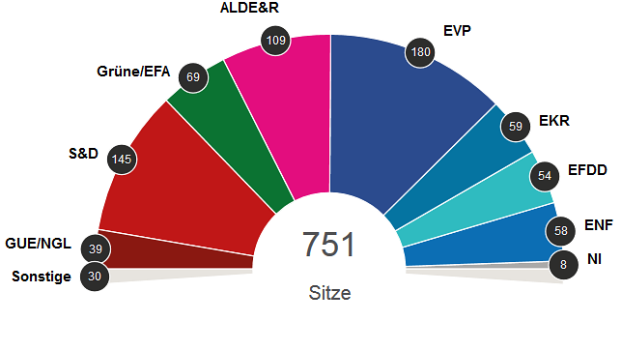
At the very latest when Greek president Alexis Tsipras announced snap elections in the wake of Syriza’s defeat in yesterday’s European elections, the downward trend of practically the entire European Left became a bitter reality. It had already looked like the Left in Europe would at best receive stable results in several countries such as Ireland and Portugal even before the elections, but would not be able to count on real success in any EU member-state.
The unexpectedly bad result for Die Linke in Germany (on this see Horst Kahr’s detailed analysis in German) was already hinted at in the polls, but the Left also failed to fulfil its own expectations in other European countries.
In France, Jean-Luc Mélenchon (who unexpectedly y took fourth place in the 2017 presidential elections) only managed to bring 6.6 percent of the electorate behind his movement, La France insoumise, despite being — in contrast to the German Left — substantially more critical of Europe. According to a first analysis by the French daily Libération on Sunday evening (05/25/2019) Le Pen’s far-right Rassemblement National (formerly known as the Front National) profited most from the protesters and sympathizers of the Gilet Jaunes movement.
It was to be expected that the European elections in Great Britain would be obscured by the ongoing Brexit debacle and Theresa May’s resignation announced last Thursday. But Labour’s final result of 14.6 percent represents the worst possible outcome of an already expected poor performance. The Liberal Democrats managed a whole six percentage points more than the Labour Party, which encompasses both leftists as well as social-democrats in the UK. In Ireland, Sinn Féin managed to duplicate its last European result and will again send four MEPs to the European Parliament.
In Spain the Unidos Podemos coalition received a stable result with 11.6 percent and five seats, but given that Pablo Iglesias was being discussed as the next Spanish president in 2015, this result must also be seen as a major blow to left-wing electoral success in Europe.
In Portugal, the left-wing parties Bloco de Esquerda (+1) and Coligação Democrática Unitária (-1) became the third-strongest force with four seats and a stable 19 percent. The social-democratic PS won an additional seat with 33.3 percent, and the Green party PAN won their a seat for the first time with five percent.
The Italian left-wing alliance Sinistra Italiana or SI failed to enter the European Parliament with 1.9 percent, although the left-wing party “L’altra Europa con Tsipras”, which did not contest the election this year, won three seats and around 4 percent of the vote in 2014. Salvini’s Lega won 28 seats or 33.6 percent of the vote and will represent one of the heavyweights of the right-wing group in the EP. The social-democrats of the Partito Democratico came second with 23.5 percent and the Five Stars Movement received 16.7 percent. The latter will most likely join the right-populist EFDD parliamentary group.
Nor was the Left able to build on its recent successes in Southeast Europe. According to initial results at the time of writing, the Slovenian left-wing alliance Levica failed to enter the European Parliament. In Eastern Europe no left-wing party met with success.
It is not impossible for Syriza to win the coming elections expected for June, but following yesterday’s result it does not seem very likely. Although Syriza did not take any significant losses vis-à-vis 2014, the conservative opposition party Nea Dimokratia emerged from the European elections as the strongest political force in Greece with 33.3 percent.
Initial analyses suggest that the Left in Europe has been thrown back to the level of 1989.
A small glimmer of hope can be registered in Belgium, where the PTB-PVDA (Parti du Travail de Belgique) won one seat and will enter the European Parliament.
The election results mean a loss of roughly ten seats for the Left in the European Parliament, falling to 42 MEPs. As there will likely be three parliamentary groups to the right of the large conservative bloc, space for progressive politics in the European Parliament will be tight despite the meteoric rise of the Greens particularly in Germany and France.
The European Left’s result makes it clear that many left-wing parties will have to make a clear decision beyond the “yes and no” to Europe in the years to come, as this position evidently cannot easily be communicated. The unfortunate and spectacular electoral victories of right-wing, Eurosceptical parties on one hand and of liberal and Green parties with a pro-European approach on the other make this all the more clear. The decision will be even more difficult given that Brussels will probably be governed by a coalition of liberal and conservative forces for the next five years and will not pursue any goals that could improve Europe’s image on the Left.
Johanna Bussemer works as a Senior Advisor in the Rosa-Luxemburg-Stiftung’s Europe Unit in Berlin. Translation by Loren Balhorn.